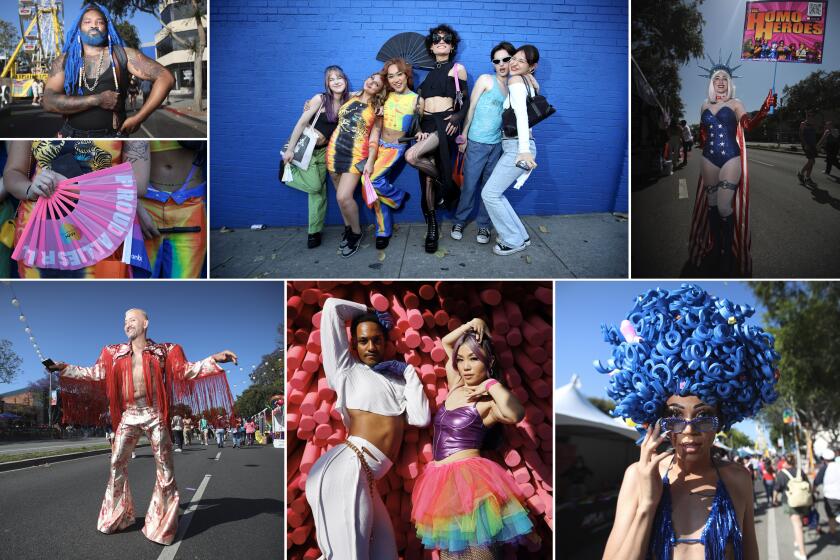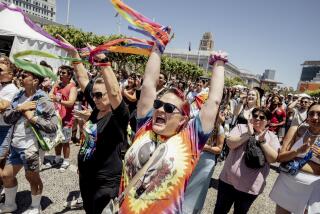At Pride parades, LGBTQ+ Angelenos ‘show our joy to the world’ amid conservative backlash
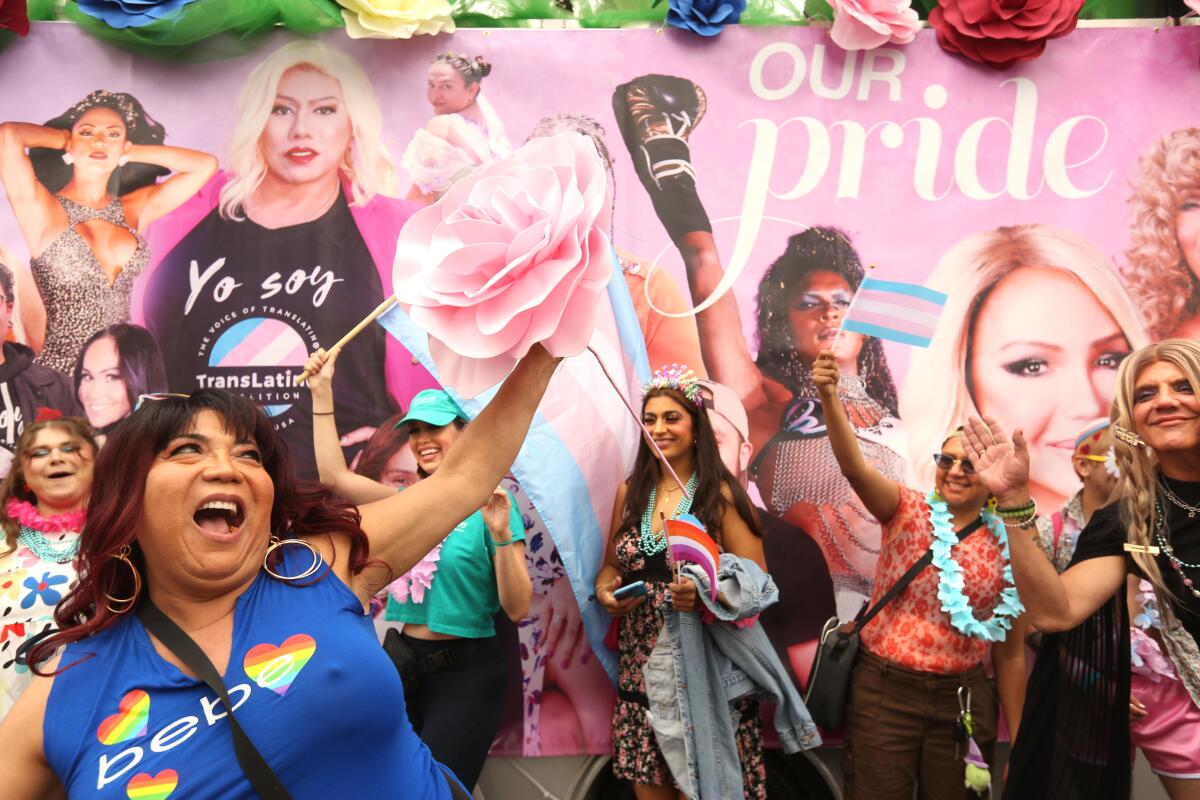
When West Hollywood incorporated in 1984 and seated the nation’s first city council with an openly gay majority, it grabbed the world’s attention — and not in an entirely positive way.
One year, council members got so many threats that they wore ballistic vests on a float in the L.A. Pride Parade, said Councilman John Heilman, who was on the inaugural council.
They weren’t intimidated — too much was at stake.
“Us being out and being visible — that in and of itself is a political statement,” said Heilman, 65, who is gay and has been attending Pride events for four decades.
Since then, there have been tragedies and trials — and immense progress as LGBTQ+ people found broader acceptance in American society, won the right to same-sex marriage, could serve openly in the U.S. military.
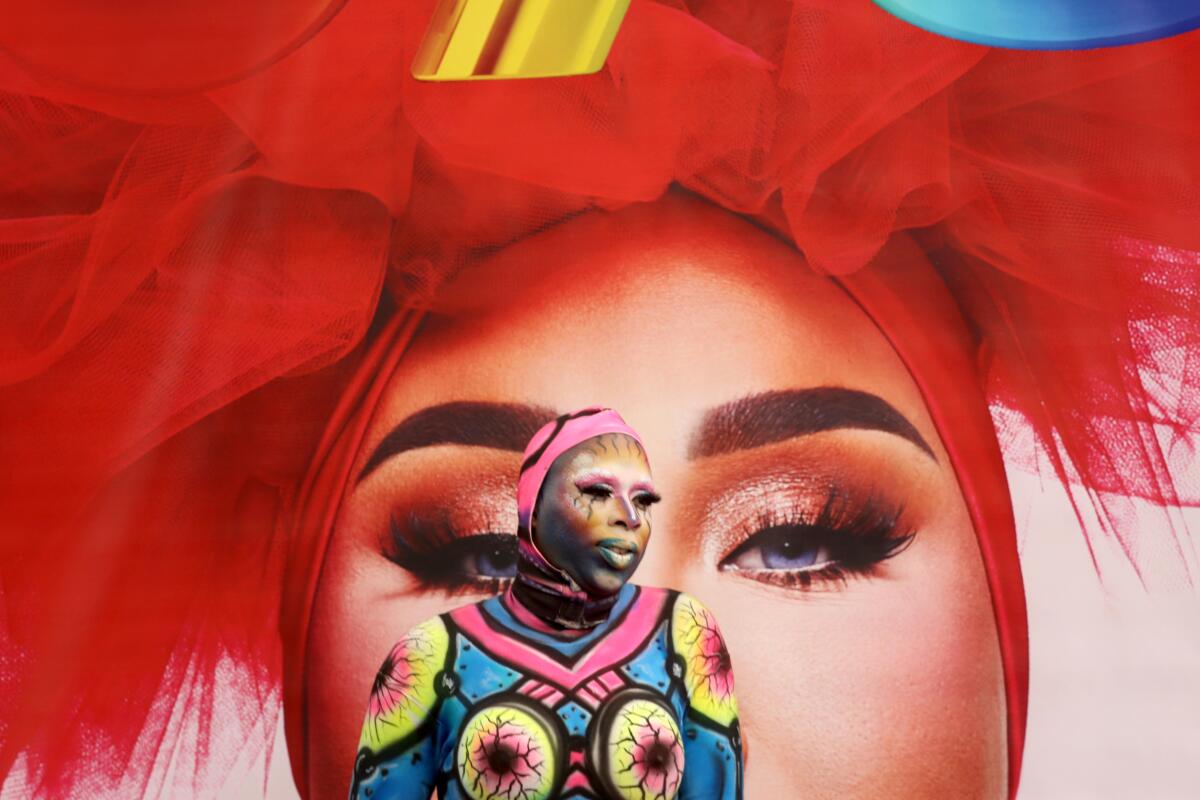
It seemed that, especially in liberal California, the LGBTQ+ movement had finally gone mainstream. To some, the colorful annual parades even became — of all things — kind of bland.
But this year, Pride Month comes amid a volatile national backlash against LGBTQ+ people, from conservative lawmakers’ efforts to ban drag shows and restrict the rights of transgender people to outcry against brands such as Bud Light and Target for marketing to queer people.
A Times reporter and photographer interviewed attendees at West Hollywood’s longstanding Pride celebration. At a time when states are implementing legislation targeting LGBTQ+ communities, some said they came to Pride for fun, some to find community, and some to be heard.
In Southern California recently, protests erupted in North Hollywood and Glendale over the teaching of gender and sexuality in schools. The L.A. Dodgers invited, then booted, then re-invited the Sisters of Perpetual Indulgence, a group of satirical nuns in drag, to its Pride Night.
For queer people in and around West Hollywood, the internationally known haven for LGBTQ+ culture and longtime home of L.A. Pride, the vitriol has been met with sadness and anger, but little surprise.
Amid the backlash, they say, Pride feels more relevant than ever.
“It may be a little bit passé for some of us who’ve been around a long time, but I have to say, every Pride I feel a sense of renewal. ... I see all these young people out celebrating in a way I don’t think I did at their age, and that gives me a lot of hope,” Heilman said.
Bamby Salcedo, president and chief executive of the TransLatin@ Coalition, said that with right-wing politicians seemingly using transgender people “as political pawns” to “gain votes and to cater to extremist people,” it feels especially important this year to be marching.
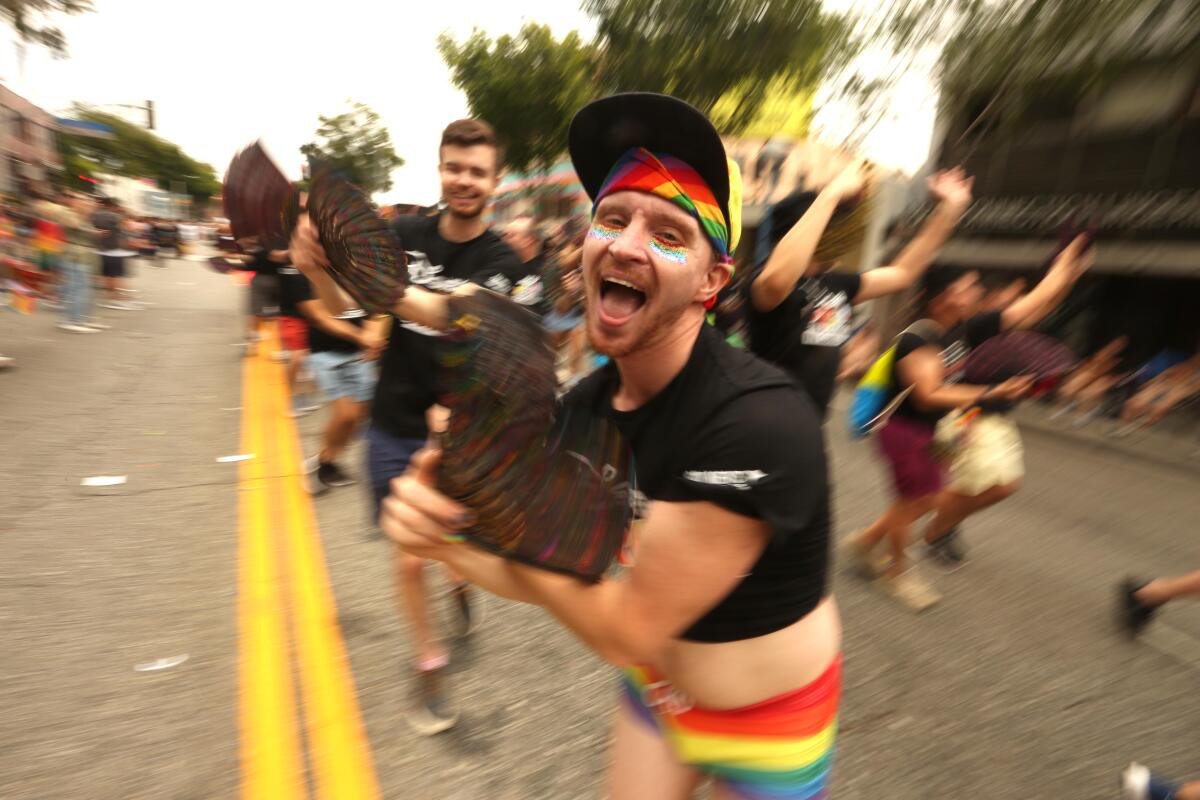
“If we focus on the negativity, that will bring us down,” said Salcedo, 53. “When we have these moments like Pride, we are ... able to show our joy to the world and our community so that they are able to understand that, regardless of the challenges we continue to experience, we find joy in whatever way possible.”
As Pride grew into a social — and financial — behemoth, fissures emerged.
This month, L.A. Pride and the newer WeHo Pride are taking place on back-to-back weekends, two miles apart — the result of years of tension between L.A. Pride’s parent organization, Christopher Street West, and the city of West Hollywood.
Critics said L.A. Pride, which at 53 is one of the nation’s oldest Pride parades, had become too corporate, the festival tickets too expensive. And there were widespread complaints that the organization and city were unwelcoming of queer people of color and transgender people.
So West Hollywood, which hosted L.A. Pride for four decades, launched its own parade and festival last year.
This year’s WeHo Pride wound along Santa Monica Boulevard last weekend. L.A. Pride will step off Sunday morning at Sunset Boulevard and Highland Avenue, about four blocks northeast of West Hollywood city limits.
Salcedo marched in WeHo Pride while dressed as a social justice warrior carrying a shield that read, “Invest in Trans Lives.” And she will be at the L.A. Pride Parade this weekend.
For the TransLatin@ Coalition, she said, Pride isn’t just a party. It’s a critical venue for passing out information about resources for queer people, about combating hate and about the prevention of COVID-19 and other diseases.
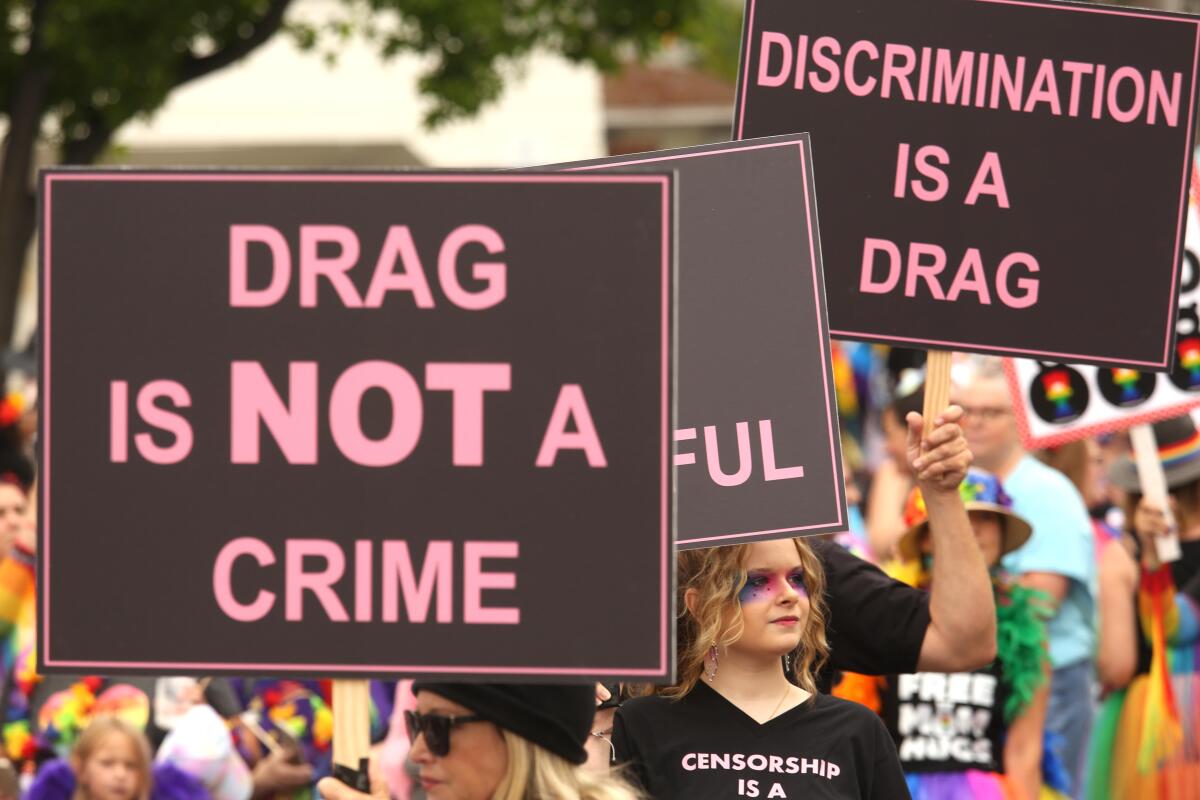
Gerald Garth, the board president for Christopher Street West, has been coming to L.A. Pride for a decade.
In 2013, Garth had just moved to Los Angeles from Louisiana. He hopped on a bus to West Hollywood alone, wearing a feather boa and a fedora with a rainbow-colored brim.
“In the body which I occupy, there has to be a great level of boldness to occupy it, as a tall, dark Black man,” said Garth, 40. “There’s a very prescribed experience which society has given him, and then you layer that with an LGBTQ+ experience.”
By the time he finished walking down Santa Monica Boulevard, Garth felt lighter. More joyful. It felt, he said, like he was “initiated into the rainbow.”
No matter what’s going on politically, first-timers are transformed by the Pride parade each year, Garth said.
With thousands of people on the streets, security is a top priority, organizers for both L.A. Pride and WeHo Pride said.
Increasingly, there is debate about the presence of armed law enforcement officers at Pride.
The LGBTQ+ community has a fraught history with police, who, for decades, raided gay bars such as the famed Stonewall Inn in New York and the Black Cat tavern in Silver Lake.
At WeHo Pride last weekend, Los Angeles County sheriff’s deputies arrested two volunteers at a booth for Equal Means Equal, a nonprofit that pushes for the adoption of the Equal Rights Amendment to the U.S. Constitution.
A video posted to Twitter shows at least six uniformed deputies wrestling LGBTQ+ activist Xodiac Rose and their friend Abby Thomas to the pavement.
“At Pride, oh, my God!” a bystander shouted.
“This is what we mean!” Rose, 25, screamed as they were being handcuffed. A deputy, Rose yelled, “was being homophobic” and laughing at signs at the booth.
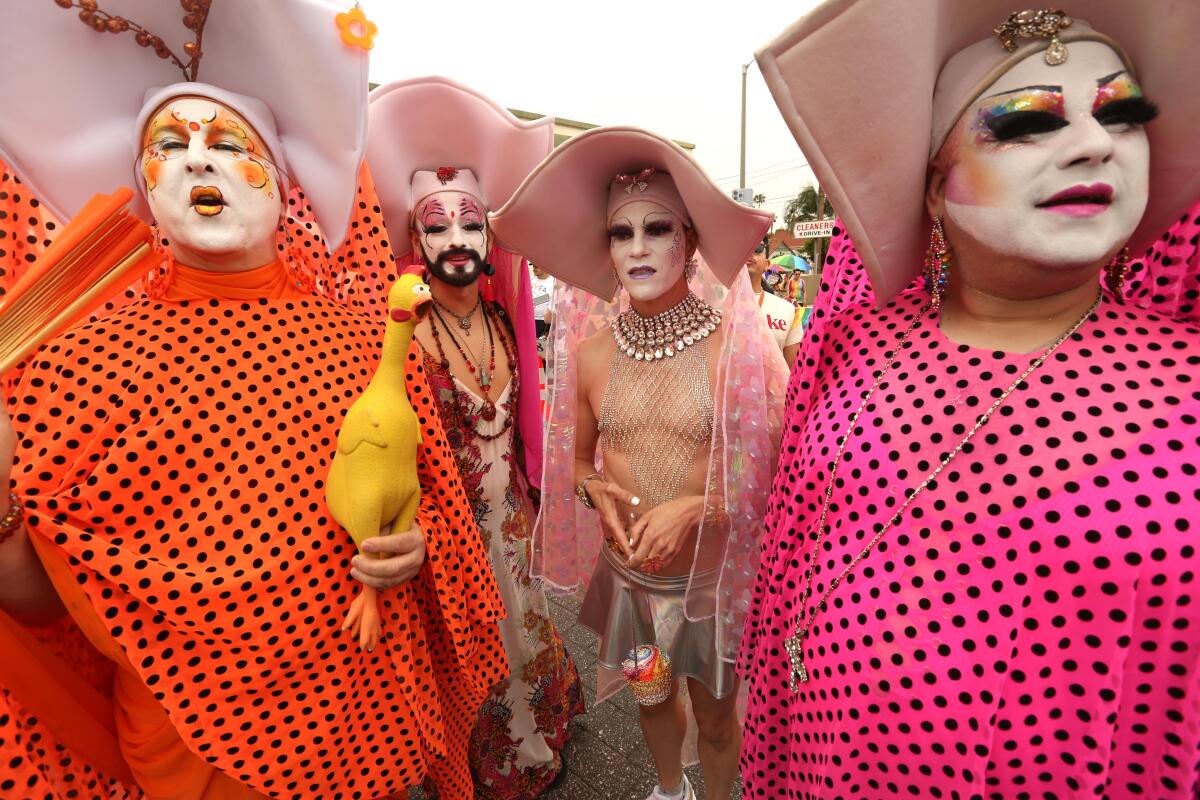
In a statement, the Sheriff’s Department said Rose, who was in custody for four days, had an outstanding warrant on claims of battery, vandalism and robbing someone of a cellphone outside the West Hollywood Library in April.
Thomas, 28, was arrested on suspicion of “interfering and obstructing an arrest,” according to the Sheriff’s Department. She was released from custody hours later, and witnesses dispute the allegation.
Alice Crenshaw, a spokesperson for Equal Means Equal who witnessed the arrests and called them “extremely aggressive,” said the warrant against Rose stemmed from a protest outside a Drag Queen Story Hour event at the West Hollywood Library.
Videos posted on Twitter show Rose voguing in front of a man filming outside the library. Rose then stomped on a cellphone. A far-right website called Right Now Views — which includes videos of protests outside LGBTQ+ events — created a wanted poster with photos of Rose, the words “Tweaker Antifa” and a phone number for the Sheriff’s Department.
In an email, West Hollywood Mayor Sepi Shyne said it was “deeply disconcerting to see images of anyone being held on the pavement surrounded by deputies in gear” and “even more alarming when this takes place in our safe LGBTQ+ spaces.”
“Pride celebrations are supposed to be places where we as queer people feel empowered, affirmed, and safe,” she wrote. “We can’t lose sight of the fact that this is emblematic of a larger division in our nation right now.”
Shyne said she has heard from community members who want no law enforcement at Pride celebrations and from others who are grateful for added security during tense times. The city, she said, is working to “balance safety concerns, which is our responsibility during Pride, with the legitimate concerns of our LGBTQ community members who have had difficult relationships with law enforcement in the past.”
Shyne, 46, who is Iranian American and the first queer woman of color elected to the City Council, said Pride is essential.
“In Iran, LGBTQ people are given the death sentence, so there are no Pride celebrations,” she wrote.
“Pride events, with all their public displays of flair, flamboyance, and fun are vital — because someone somewhere, even in a City like West Hollywood, still may believe they would be better off dead than be LGBTQ. We can’t let that happen.”
On Santa Monica Boulevard in West Hollywood this week, people were reveling in Pride Month, with all its rainbow flags and ribald humor.
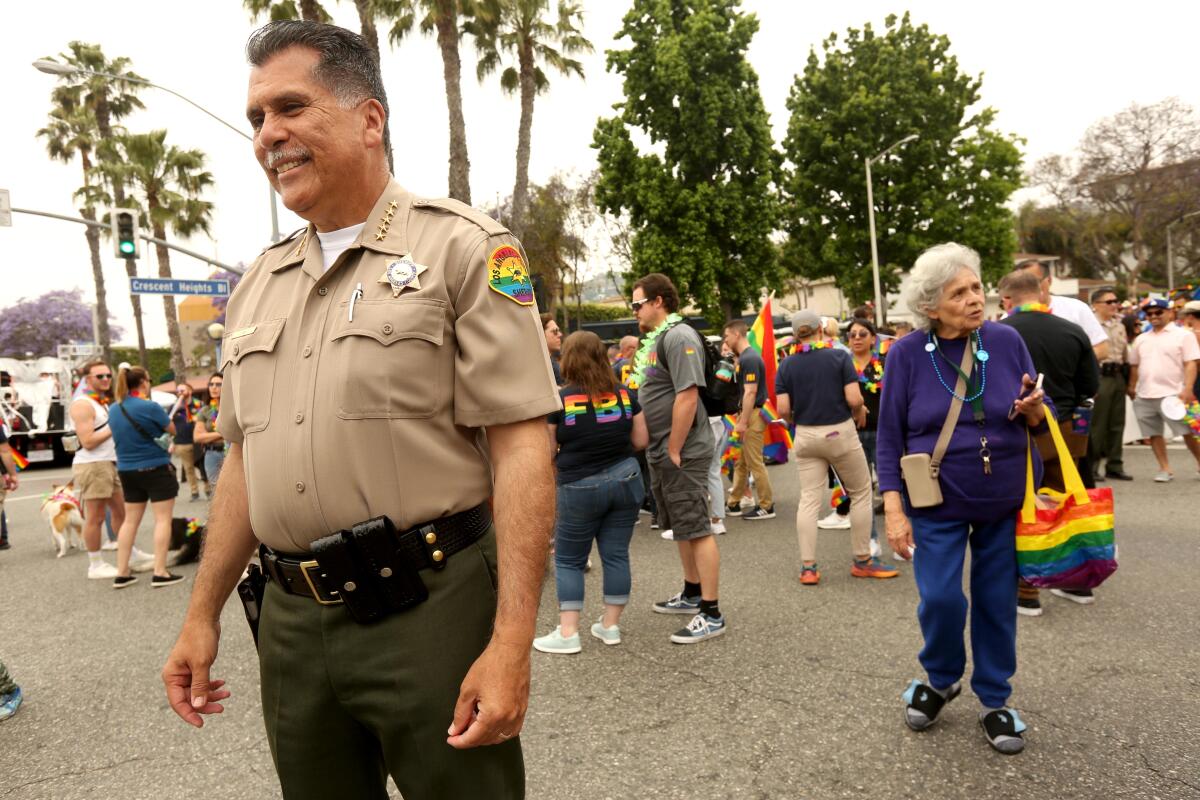
A banner on the window of Hugo’s Restaurant read: #dragisnotacrime. A sign in the window of the West Hollywood Library promoting Drag Queen Story Hour advertised “Fake Eyelashes, Real News.” Giant ads with muscular men wearing skimpy swim trunks and stethoscopes promoted an HIV-prevention drug with the words: “I Ho, You Ho, WeHo ... together on PrEP.”
At the Gallery at Circus of Books, Jesús Clauss, 42, a studio manager for fashion designer Julia Clancey, adjusted displays for her Pride collection, arranging “budgie smugglers” — briefs-style swim bottoms — with colorful banana prints and shimmery kaftans.
Clauss, of Koreatown, went to WeHo Pride at his husband’s urging. He initially resisted because, as a younger gay man, he felt a lot of pressure to “have a certain physique.”
But his husband told him: “Let’s make our own memories.” He came away inspired, especially by younger queer people who “are not as concerned about appearance.”
The same weekend, his niece came out as pansexual by posting on Instagram that she was “living my truth.” She had faced some resistance from loved ones. He shared his own experiences as a queer person and told her he supported her.
The national backlash against LBGTQ+ people is frustrating, Clauss said. But ultimately, things are so much better than when he was discovering his sexuality, without access to the internet or much information at all.
“It seems like the rhetoric,” he said, “is a result of all the progress we’ve made.”
More to Read
Sign up for Essential California
The most important California stories and recommendations in your inbox every morning.
You may occasionally receive promotional content from the Los Angeles Times.
